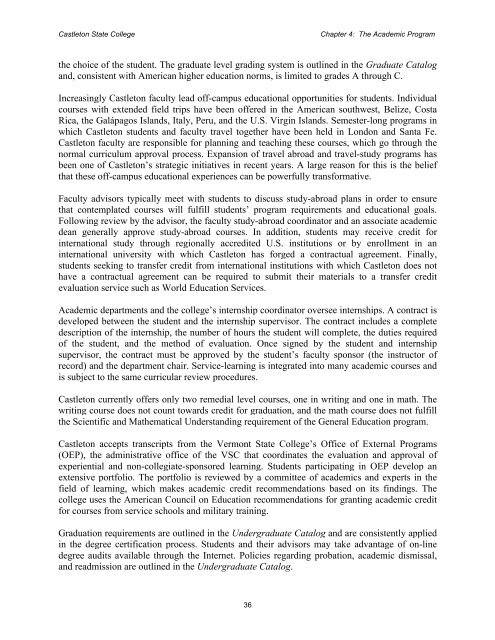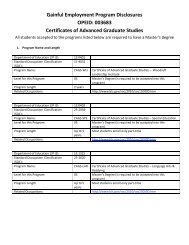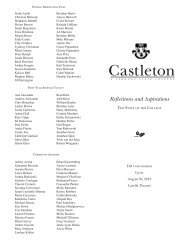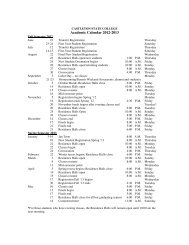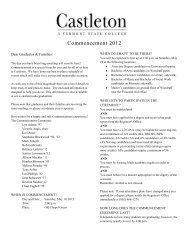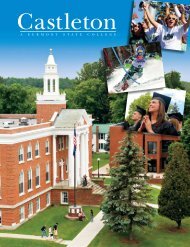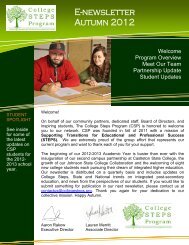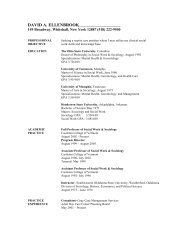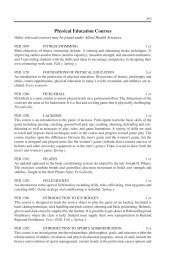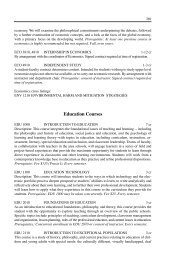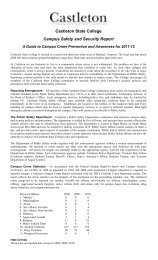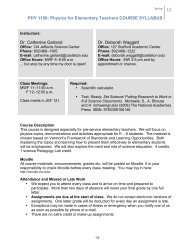Self-study submitted to NEASC, September 2011 - Castleton State ...
Self-study submitted to NEASC, September 2011 - Castleton State ...
Self-study submitted to NEASC, September 2011 - Castleton State ...
Create successful ePaper yourself
Turn your PDF publications into a flip-book with our unique Google optimized e-Paper software.
Castle<strong>to</strong>n <strong>State</strong> CollegeChapter 4: The Academic Programthe choice of the student. The graduate level grading system is outlined in the Graduate Catalogand, consistent with American higher education norms, is limited <strong>to</strong> grades A through C.Increasingly Castle<strong>to</strong>n faculty lead off-campus educational opportunities for students. Individualcourses with extended field trips have been offered in the American southwest, Belize, CostaRica, the Galápagos Islands, Italy, Peru, and the U.S. Virgin Islands. Semester-long programs inwhich Castle<strong>to</strong>n students and faculty travel <strong>to</strong>gether have been held in London and Santa Fe.Castle<strong>to</strong>n faculty are responsible for planning and teaching these courses, which go through thenormal curriculum approval process. Expansion of travel abroad and travel-<strong>study</strong> programs hasbeen one of Castle<strong>to</strong>n’s strategic initiatives in recent years. A large reason for this is the beliefthat these off-campus educational experiences can be powerfully transformative.Faculty advisors typically meet with students <strong>to</strong> discuss <strong>study</strong>-abroad plans in order <strong>to</strong> ensurethat contemplated courses will fulfill students’ program requirements and educational goals.Following review by the advisor, the faculty <strong>study</strong>-abroad coordina<strong>to</strong>r and an associate academicdean generally approve <strong>study</strong>-abroad courses. In addition, students may receive credit forinternational <strong>study</strong> through regionally accredited U.S. institutions or by enrollment in aninternational university with which Castle<strong>to</strong>n has forged a contractual agreement. Finally,students seeking <strong>to</strong> transfer credit from international institutions with which Castle<strong>to</strong>n does nothave a contractual agreement can be required <strong>to</strong> submit their materials <strong>to</strong> a transfer creditevaluation service such as World Education Services.Academic departments and the college’s internship coordina<strong>to</strong>r oversee internships. A contract isdeveloped between the student and the internship supervisor. The contract includes a completedescription of the internship, the number of hours the student will complete, the duties requiredof the student, and the method of evaluation. Once signed by the student and internshipsupervisor, the contract must be approved by the student’s faculty sponsor (the instruc<strong>to</strong>r ofrecord) and the department chair. Service-learning is integrated in<strong>to</strong> many academic courses andis subject <strong>to</strong> the same curricular review procedures.Castle<strong>to</strong>n currently offers only two remedial level courses, one in writing and one in math. Thewriting course does not count <strong>to</strong>wards credit for graduation, and the math course does not fulfillthe Scientific and Mathematical Understanding requirement of the General Education program.Castle<strong>to</strong>n accepts transcripts from the Vermont <strong>State</strong> College’s Office of External Programs(OEP), the administrative office of the VSC that coordinates the evaluation and approval ofexperiential and non-collegiate-sponsored learning. Students participating in OEP develop anextensive portfolio. The portfolio is reviewed by a committee of academics and experts in thefield of learning, which makes academic credit recommendations based on its findings. Thecollege uses the American Council on Education recommendations for granting academic creditfor courses from service schools and military training.Graduation requirements are outlined in the Undergraduate Catalog and are consistently appliedin the degree certification process. Students and their advisors may take advantage of on-linedegree audits available through the Internet. Policies regarding probation, academic dismissal,and readmission are outlined in the Undergraduate Catalog.36


